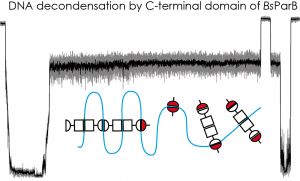For a cell to divide correctly, its DNA must be meticulously organized. Only in this way will each daughter cell receive its part of the genetic material. In bacteria, the ParB protein is central to organizing DNA for distribution during cell division. Nonetheless, there are still many questions as to how this protein acts.
Scientists from the Centro Nacional de Biotecnología of the CSIC (CNB-CSIC) used single-molecule manipulation techniques to identify the structural basis of ParB function. In their study, published in the journal eLife, they describe a ParB domain able to bind DNA non-specifically and other ParB proteins simultaneously. This second domain is added to another known site that allows the protein to associate very specific points of bacterial DNA. This structure allows organization and condensation of the DNA in certain chromosome regions, which is then divided equally among the daughter cells.
Description of this domain allows an unsettled question to be clarified; that is, how ParB is able to bind bacterial DNA simultaneously at very specific points and at very distant, non-specific areas. "In this study we show that it is a very complex protein, with two different DNA-binding zones and a third that binds other ParB proteins,” explains Fernando Moreno, CNB-CSIC scientist and co-director of the study. “This process is very well defined in eukaryotes, which organize their DNA to form centromeres. Less attention has been paid to division in bacteria, whose DNA is also organized in condensed structures equivalent to eukaryotic centromeres," concludes César López Pastrana, CNB-CSIC researcher and the study's lead author.
- Fisher GL*, Pastrana CL*, Higman VA*, Koh A, Taylor JA, Butterer A, Craggs T, Sobott F, Murray H, Crump MP, Moreno-Herrero F, Dillingham MS. The structural basis for dynamic DNA binding and bridging interactions which condense the bacterial centromere. Elife. 2017 Dec 15;6. pii: e28086.






